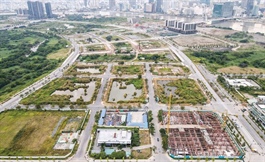Viet Nam eyes raising average floor area per person
Viet Nam eyes raising average floor area per person
Viet Nam is looking to increase the average housing floor area per person to 27sq.m by 2025, aiming for 28sq.m in urban areas, and 26sq.m in rural areas.

The target is set in the national housing development strategy for 2021-2030, recently signed by Deputy Prime Minister Le Van Thanh.
By 2030, Viet Nam strives to increase the proportion of solid houses nationwide to 85-90 per cent, with 100 per cent in urban areas and 75-80 per cent in rural areas; and equip 90 per cent of houses with electricity and water supply and wastewater drainage systems.
The strategy focuses on renewing specific policies for each kind of housing, and the target group of social housing policies including workers and low-income people in urban areas, and officers and soldiers of the people's armed forces.
Poor households in rural areas, and ethnic minority and mountainous areas will receive support from the State budget, preferential loans and other local resources to build houses.
Families living in areas frequently affected by natural disasters and climate change such as storms, floods and landslides, will be offered preferential loans to build or repair houses.
The strategy also set the goal of developing and repairing more than 1 billion sq.m of houses, equivalent to about 11.9 million apartments.
The move aims to create conditions for everyone to have a place to live, and focus on improving the quality of housing, as well as implementing the trend of green and smart housing.
The strategy also sets out tasks and solutions on housing development: complete housing policies; planning and development of land funds; national housing development activities and local housing development programmes; to increase rental housing products; and promote the development of commercial housing with reasonable prices.
Housing development must include urban development, urban upgrading and re-construction of old apartment buildings.
The housing development will be implemented according to targets on sustainable real estate market development.
Policies on real estate business as well as policies related to transactions, housing business and housing projects will also be completed.
The strategy also aims to simplify administrative procedures in the housing investment and development process from selecting investors, allocating land, investing in construction, granting certificates of land use rights and home-ownership.
Regulations on housing management and development will also be amended according to housing development master plans, strategies and programmes.
Viet Nam’s average housing floor area reached 25sq.m per person in 2021, about 1sq.m higher than in 2020, according to the Ministry of Construction.






















